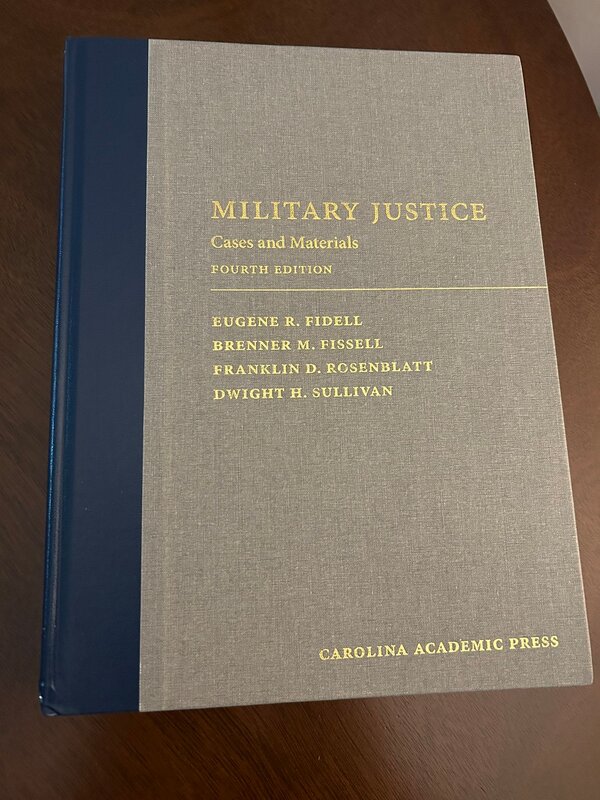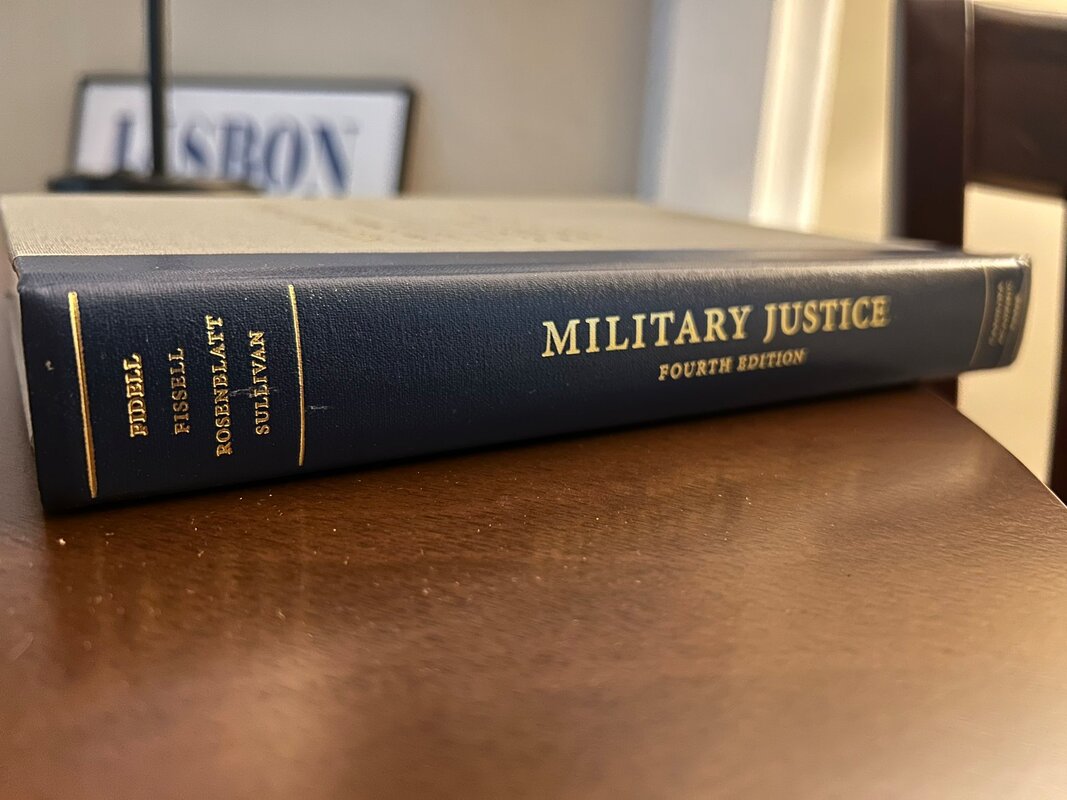|
On the Appellate Advocacy Blog, Robert Peck discusses how you might use a Reply to the Government's Answer to make a new argument. The biggest obstacle at that point to reorienting the case to a potentially winning argument is a reply brief should only respond to an opponent’s arguments and not launch new ones. New arguments raised for the first time in a reply brief are often forfeited and potentially waived. The terms forfeited and waived have different meanings for an appellate court. Forfeiture generally means a failure to make the timely assertion of a right or argument. Waiver means the intentional relinquishment or abandonment of a known right or argument. See United States v. Campbell, 26 F.4th 860, 872 (11th Cir.) (en banc), cert. denied, 143 S. Ct. 95 (2022).
No. 23-0085/AF. U.S. v. Jonel H. Guihama. CCA 40039. On consideration of the petition for grant of review of the decision of the United States Air Force Court of Criminal Appeals, it is ordered that said petition is hereby granted on the following issue: WHETHER THE MILITARY JUDGE ABUSED HER DISCRETION BY ADMITTING A CONFESSION THAT WAS NOT TRUSTWORTHY BECAUSE IT LACKED SUFFICIENT CORROBORATION. An issue of note, Consistent with that authority, in United States v. Perkins, the CAAF acknowledged “[a] familiar principle of appellate practice is that an appellee or respondent may defend the judgment below on a ground not earlier aired.” 78 M.J. 381, 386 n.8 (C.A.A.F. 2019) (alteration, internal quotation marks, and citations omitted); see also United States v. Bess, 80 M.J. 1, 11–12 (C.A.A.F. 2020) (approving Court of Criminal Appeals’ decision to uphold the ruling of a military judge for a different reason than the ones on which the military judge relied). We also find persuasive the concurring opinion by Judge Hardy in Whiteeyes, which considered the findings testimony of an expert witness even though “the military judge did not have the benefit of the expert witness’ testimony when he ruled on Appellant’s motion.” 82 M.J. at 180 (Hardy, J., concurring in the judgment). Judge Hardy noted that testimony was “properly included in the joint appendix and can be considered by this Court.” Id. The opinion of the court in Whiteeyes similarly relied on that expert witness’s testimony. No. 23-0206/AF. U.S. v. Ryan M. Palik. CCA 40225. On consideration of the petition for grant of review of the decision of the United States Air Force Court of Criminal Appeals, it is ordered that said petition is hereby granted on the following issue: THE GOVERNMENT LOST THE ONLY TWO VIDEO-RECORDED STATEMENTS FROM SM, THE COMPLAINING WITNESS FOR EVERY CONVICTED OFFENSE. DID DEFENSE COUNSEL PROVIDE INEFFECTIVE ASSISTANCE BY FAILING TO FILE AN RCM 914 MOTION AFTER SM'S TESTIMONY? We find that Appellant has failed to meet his burden to demonstrate deficient performance by his trial defense counsel. Applying the Polk factors to the present case, it is uncontroverted that trial defense counsel did not file a motion under R.C.M. 914 for production of SM’s video-recorded statements to AFOSI. That said, we find that Appellant’s trial defense counsel have articulated a reasonable rationale for not doing so—they could not confirm that the video recordings in question ever existed, and feared they might exist. We also find that it was reasonable for Appellant’s defense counsel to question whether the video recorded interviews existed because the videos had never been viewed by AFOSI agents or any member of the prosecution team. In United States v. Flores, the court holds that creating a false set of PCS orders, presenting them to a landlord, and asking to be released from the rental because of a PCS clause is not punishable as a false official statement. The guilty plea was, therefore, improvident. The drug convictions were affirmed, as was the sentence.
United States v. CunninghamOf three issues, the Court wrote on a victim impact "statement" issue and an improper sentencing argument. Whether trial counsel’s sentencing argument was improper when she: (1) argued that Appellant’s uncharged, false statements were aggravating evidence after she had previously cited case law to the military judge that said false statements were not admissible as evidence in aggravation; and (2) told the military judge that he had seen the media and the world was watching, to justify her sentence recommendation. Expressly waived. "In this case, trial defense counsel “did not just fail to object,” but “affirmatively declined to object” when answering “no” to the military judge’s question." Had the court taken the issue, they probably would have found the arguments didn't impact the military judge because he is presumed to know the law, especially as TC had just pointed it out, and would follow the law. The AFCCA did address the issue and found that it wasn't improper to argue the world is watching because it wasn't a sufficient threat as seen from cases like, United States v. Norwood, 81 M.J. 12 (C.A.A.F. 2021); United States v. Voorhees, 79 M.J. 5, 14-15 (C.A.A.F. 2019)); United States v. Wood, 18 C.M.A. 291, 40 C.M.R. 3, 9 (C.M.A. 1969)). Perhaps the MJ asking if there were any objections was a nuanced ask? There once was a MJ who would famously respond to an objection with "not on that basis counsel." Clue, there may be an objection but you haven't said the magic words yet. Next. Whether the Air Force Court properly applied United States v. Edwards, 82 M.J. 239 (C.A.A.F. 2022) in finding error—but no prejudice—for a victim impact statement that included videos, personal pictures, stock images of future events, and lyrical music that touched on themes of dying, saying farewell, and becoming an angel in heaven. The members had convicted the Appellant of murder, for which the MJ sentenced him to 18 years confinement. The dead child's mother and grandmother testified in sentencing without objection. The mother also gave an unsworn victim impact statement. The victim impact statement consisted of her orally addressing the military judge while using a PowerPoint slideshow that consisted of pictures, videos, and somber music. The PowerPoint presentation contained eleven slides, including animations which included transitions, appearing and disappearing text, and slides crumpling like paper that is being thrown away. It also included over fifty still images; four still images which were stock images of future life events which ZC would not experience (such as a first day at school, marriage, and graduation); and embedded presentations that automatically played video with accompanying audio. CM then finished her victim impact statement orally. CM stated that “all the slides [she] presented . . . videos, pictures, words . . . all come from [her].” A most interesting issue granted.
No. 23-0198/AF. U.S. v. Israel E. Flores. CCA 40294. On consideration of the petition for grant of review of the decision of the United States Air Force Court of Criminal Appeals, it is ordered that said petition is hereby granted on the following issue: WHETHER SENTENCE APPROPRIATENESS REVIEW FOR SEGMENTED SENTENCING MUST CONSIDER EACH SEGMENTED SENTENCE TO CONFINEMENT, OR INSTEAD ONLY THE OVERALL SENTENCE. NIMJ has filed an amicus pleading in United States v. Keago at CAAF. In re HVZ. "On 28 April 2023, the Defense moved the trial court to “immediately secure and produce” Petitioner’s “medical records and non-privileged materials within mental health records, specifically unprotected health information as described under United States v. Mellette[, 82 M.J. 374 (C.A.A.F. 2022)],” in the possession of the Government." The MJ had granted some discovery. On 16 May 2023, pursuant to Article 6b, Petitioner requested this court issue a writ of mandamus and stay of proceedings in the pending court-martial of United States v. Technical Sergeant MFK (the Accused). Petitioner requests this court “vacate the trial court’s decision [dated 11 May 2023] to order disclosure of extensive medical records” of Petitioner. On 19 May 2023, this court issued an order staying the court-martial proceedings and staying further implementation of the trial court’s 11 May 2023 order to the 56th Medical Group (56 MDG), pending further order by this court. This court ordered briefs and [h]aving considered [everything], we deny the petition. The MJ had decided to grant the defense motion in part. The military judge’s findings of fact included, inter alia, that Petitioner was the “primary witness against the [A]ccused” on each of the charged offenses; that Petitioner and the Accused were married at the time of the alleged offenses; and that Petitioner had told multiple individuals she had sought medical and mental health treatment due to injuries allegedly caused by the Accused, and had spoken with Family Advocacy personnel. The military judge noted the responses to the defense motion from the Government and from Petitioner, but stated he had not considered the latter due to Petitioner’s “lack of standing before this trial court,” citing In re HK. |
Disclaimer: Posts are the authors' personal opinions and do not reflect the position of any organization or government agency.
Co-editors:
Phil Cave Brenner Fissell Links
SCOTUS CAAF -Daily Journal -2024 Ops ACCA AFCCA CGCCA NMCCA JRAP JRTP UCMJ Amendments to UCMJ Since 1950 (2024 ed.) Amendments to RCM Since 1984 (2024 ed.) Amendments to MRE Since 1984 (2024 ed.) MCM 2024 MCM 2023 MCM 2019 MCM 2016 MCM 2012 MCM 1995 UMCJ History Global Reform Army Lawyer JAG Reporter Army Crim. L. Deskbook J. App. Prac. & Pro. CAAFlog 1.0 CAAFlog 2.0 Archives
July 2024
Categories
All
|




 RSS Feed
RSS Feed